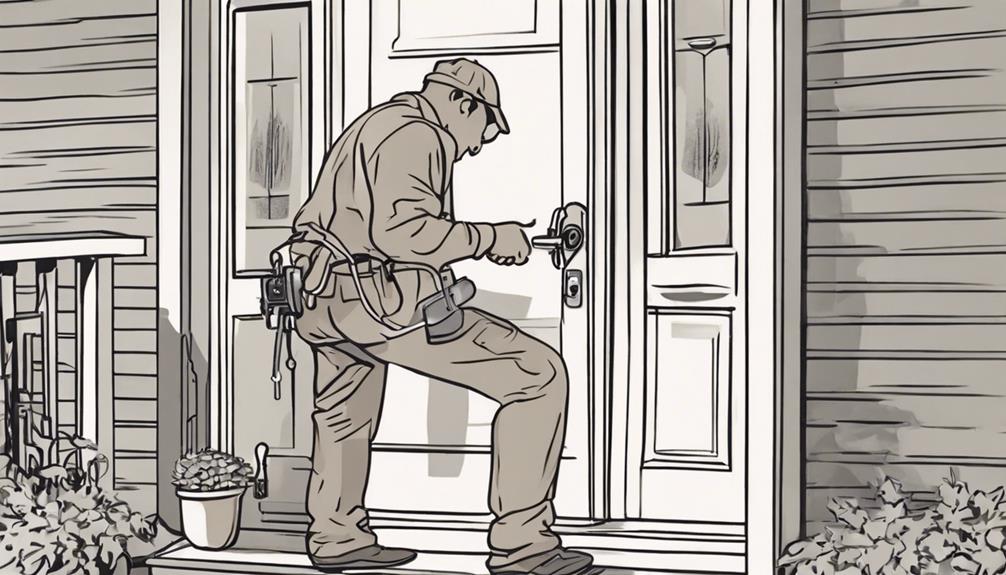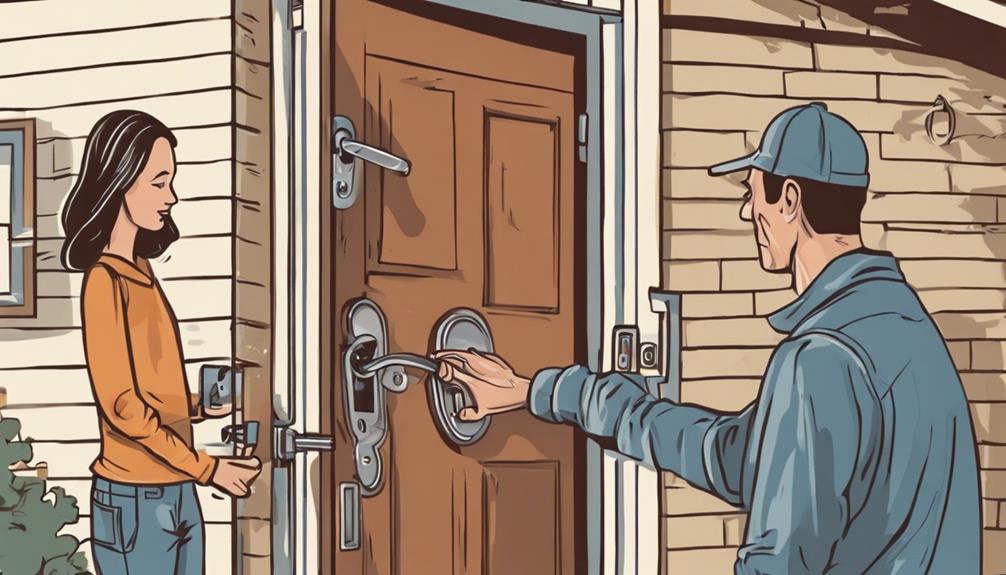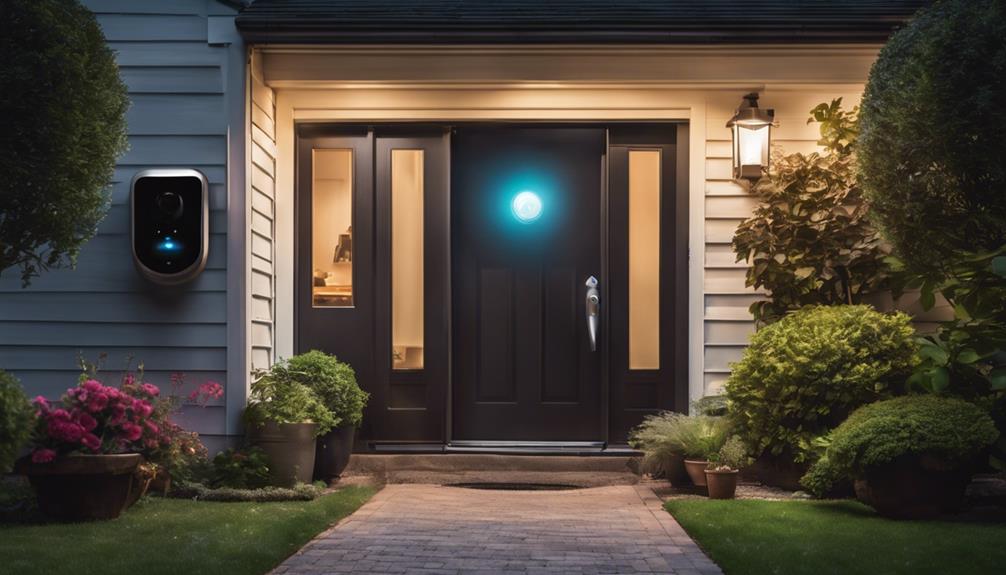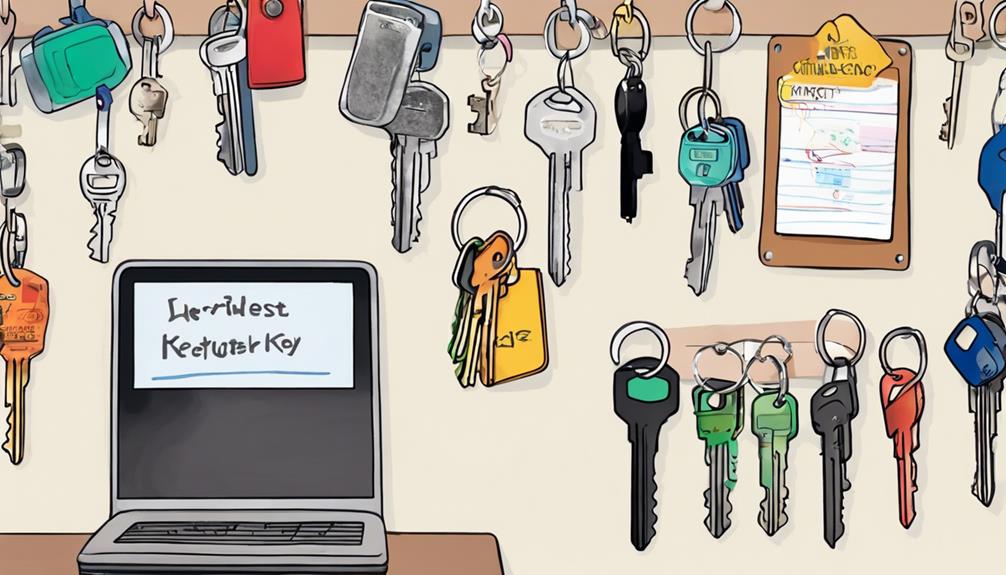If you’ve lost your house keys, first check nearby areas where they might’ve been misplaced. Look through your pockets, bags, and even under couch cushions. If you’re still unable to find them, reach out to housemates or people who were around when they were last seen. It’s a good idea to keep a locksmith’s contact handy for such emergencies, as well as spare keys. Consider safe, accessible spots in your home to store these spares securely. In the meantime, contact trustworthy friends or neighbors who might have a copy of your key. For enhancing your long-term security, think about rekeying or changing your locks. Additional steps await to bolster your home’s safety.
Check Nearby Areas

First, check the areas where you were last, as you might have left your keys there. Start your quest by raiding the usual suspects: pockets, bags, and those sneaky couch cushions. They’re notorious hideouts for rogue keys. Next, scout the vicinity of your home’s entry points. Doors and windows can be key magnets; maybe your keys are playing hide and seek near the lock. Don’t forget to interrogate your housemates or anyone who was around. They might unwittingly hoard your keys or have seen them in their last known whereabouts. If all fails, and no keys turn up, you might not need to speed dial that locksmith just yet, but keep them on your radar!
Consider Spare Keys

If you’ve lost your house keys, it’s time to think about your spare keys and how they’re managed. You should keep these keys in spots that are both secure and easy to access when needed. Additionally, consider who else has a copy of your keys and make sure they are people you can trust.
Keeping Spare Keys Safe
Consider keeping your spare keys in secure yet accessible locations to prevent lockouts without compromising home security. It’s a no-brainer, right? But hold up, don’t just toss them under the flowerpot! Using key holding services or entrusting a reliable friend can safeguard your spare keys while maintaining that Fort Knox vibe. Remember, spare keys are your quick ticket to regain access when you’re locked out—no locksmith required. Implementing key duplication is not only a cost-effective preventive measure, but it’s also your secret weapon against future lock-related dramas. So, go ahead, duplicate those keys and stash them wisely—because being locked out is only funny in sitcoms, not in your chilly, pajama-clad reality.
Ideal Spare Key Locations
Now that you understand the importance of duplicating and safely storing your spare keys, let’s explore the best places to keep them. First off, avoid hiding your spare keys in no-brainer spots like under the doormat or in a flower pot; even your dog knows that trick! Instead, opt for a secure key box—these gizmos are like Fort Knox for your keys, keeping them safe but accessible. Alternatively, consider a key holder inside your home in a discreet but remembered location. You can also entrust a set to trusted family members or neighbors for emergency access. Just make sure to regularly check that these spare keys are where they should be and in good shape!
Distributing Keys Wisely
Distribute spare keys to trusted friends or family members to make sure you’re never locked out. This not only saves you the hassle and potential expense of calling emergency locksmiths but also acts as a protective measure against losing access to your abode. But hey, don’t just hand them out like candy!
| Recipient | Location | Reason |
|---|---|---|
| Mom | Next town over | She never loses anything (except her glasses) |
| Best Friend | Same city | Just a key-ring away in emergencies |
| Neighbor | Next door | Watches the house like a hawk |
Avoid the rookie mistake of hiding a spare key under the doormat or flowerpot. Instead, opt for key holding services for that extra layer of security.
Contact Trusted Friends

If you’ve lost your house keys, it’s time to reach out to your reliable contacts who might hold a spare set. You can arrange for them to meet you and hand over the keys, ensuring you regain access to your home quickly. This strategy not only saves you from the expense of a locksmith but also provides a swift resolution to your predicament.
Identify Reliable Contacts
Reach out to trusted friends or family members who might have a spare key to your home. It’s always a bit of a treasure hunt, isn’t it? When you’ve lost your keys, these reliable contacts become your unsung heroes. Think back—did you ever hand off a spare key to anyone? Hopefully, you chose trustworthy individuals for such key-related emergencies. Having reliable contacts with spare keys guarantees you have a solid backup plan for those oops moments. Make sure your network includes people who can help you regain access quickly. Remember, sharing spare keys with trustworthy individuals isn’t just about convenience; it’s your ticket back into your fortress when the drawbridge is up and you’re moat-side without a paddle.
Arrange Key Exchange
Once you’ve confirmed who has a spare key, arrange a time to meet that works for both of you to retrieve it. Communicate clearly to avoid any mix-ups that might make the situation stickier than the inside of a jam jar. When you lose your house keys, it’s important to have spare keys to trustworthy pals who can provide reliable assistance. Make sure your trusted friends are prepared and able to help you swiftly, especially in emergency situations. This spare key exchange isn’t just a handoff; it’s your ticket back into your fortress of solitude. Make sure the process is as smooth as a locksmith’s sales pitch, and you’ll regain access before you know it.
Call Low Rate Locksmith

Losing your house keys can be stressful, but contacting Low Rate Locksmith provides a reliable solution with their 24/7 emergency services. When you’re locked out, their professional locksmiths swoop in to save the day—or night! With quick response times, they’re like the superheroes of the lock world. They don’t just replace your lost house keys; they can also perform lock changes and security upgrades, ensuring you’re not just back inside, but also more secure than ever. It’s not just about getting you through the door; it’s about giving you peace of mind. So, next time you find your pockets empty where keys should be, remember, Low Rate Locksmith is just a call away!
Rekey Your Locks

If you’ve lost your house keys, consider rekeying your locks as an effective and economical security upgrade. Rekeying is not just cost-effective; it’s like giving your locks a secret makeover! You keep your snazzy high-security hardware but change the inner workings, so any old lost keys become as useless as socks in sandals. Expert locksmiths can zip through this process, saving you time and sparing your wallet. It’s a slick move to maintain security without the drama of full lock replacement. No need to buy the whole ice cream truck when you just want a scoop, right? Rekey and rest easy, knowing you’ve updated your security smartly and efficiently.
Change Your Locks

While rekeying is an effective option, you might consider changing your locks entirely to guarantee maximum security for your home. If you’ve lost your house keys, don’t just sit there and hope a superhero drops them back on your doorstep. Get proactive! Call a locksmith and change your locks. This isn’t just about protecting your spare key; it’s about upgrading your home’s protective measures. Let’s face it, lost keys are a perfect excuse to give your home security a facelift. Plus, you’ll enjoy the peace of mind that comes from knowing no random key-finder can waltz into your fortress. So, don’t compromise on safety—upgrade and protect your sanctuary from those mysterious key-gobbling gremlins!
Duplicate Your Keys

Consider duplicating your house keys as a practical way to prevent lockouts and guarantee you always have access to your home. Losing your keys can be a real headache, but having a spare can save you from the hassle and the cost of calling a locksmith. It’s like giving your future self a high-five! Make sure you store that extra key with someone trustworthy or in a secret spot that isn’t the front doormat or the flowerpot—because let’s be real, that’s where every sitcom burglar looks first.
Key duplication is not just about convenience; it’s about maintaining security without losing your cool—or your keys. So, duplicate those keys and keep your locksmith’s number for a real emergency, not just a lost key!
Upgrade Home Security

Upgrade your home security by installing BS3621 locks, which feature advanced anti-theft properties. If you’ve lost your keys, it’s the perfect excuse to enhance your locks, not just replace them. Consider this a nudge from the universe to take a deep dive into upgrading your security!
Why stop at traditional locks? Explore the world of keyless locks. They’re not just for secret agents anymore! Going automated or electronic can mean you’ll never have to worry about losing your keys again. Plus, your local locksmith will become your new best friend during this upgrade.
Changing the locks can also sweeten your insurance policy deals. Protective measures like these are insurance gold, so go ahead, make that call!
Prevent Future Losses

To guarantee future key losses, securely store spare keys in accessible yet concealed locations. Don’t stash them under your doormat or flowerpot—everyone knows those spots, and you might as well put up a ‘Rob Me’ sign! Instead, opt for less obvious hideaways that only you and trusted individuals know. It’s like a treasure hunt, but you’re hiding it from the pirates!
Regularly check designated key locations to make certain they haven’t played hide and seek. Implement security upgrades recommended by locksmiths to keep your keys as secure as Fort Knox. By taking these steps, you’ll minimize the risk of misplacement and avoid those all-too-familiar potential key loss incidents. Remember, a key lost is a headache gained!
Frequently Asked Questions
How Do I Claim Lost Keys on Home Insurance?
If you’ve lost your house keys and want to claim on your home insurance, first check your policy to confirm that lost keys are covered. Then, contact your insurance provider to report the loss and initiate a claim. You’ll likely need to provide details about the circumstances of the loss and possibly a police report if theft is involved. Follow their process closely to make sure you meet all requirements for a successful claim.
Yes, smart locks can indeed notify you of unauthorized entry. They’re pretty nifty gadgets that connect to your phone, sending you real-time alerts if someone interferes with your lock. Plus, you can check the activity logs to see all access attempts—authorized or not. If you’re really into gadgets, some models even have built-in cameras, so you can literally watch who’s trying to sneak in. Talk about a high-tech watchdog!
What Are the Risks of Leaving a Spare Key Outside?
Leaving a spare key outside might seem like a handy backup plan, but you’re actually rolling out the welcome mat for burglars. Over half of home break-ins involve thieves finding a spare key. These criminals know all the classic hiding spots—under mats, in fake rocks, above doorframes. You’re better off using a secure key holding service or leaving a spare with someone you trust. Don’t make it easy for the bad guys!
How Long Does It Typically Take to Rekey a Lock?
Rekeying a lock usually takes between 30 minutes to an hour. You’ll need specialized tools and skills to do it efficiently, so it’s often best to call a professional locksmith. They have the expertise to quickly rekey your lock without compromising your home’s security. This process is cost-effective, allowing you to use the same lock but ensuring that only the new keys can operate it, enhancing your security.
Just like borrowing a cup of sugar, sharing keys with neighbors might seem neighborly, but it’s a gamble. You must trust them as if they were family because those keys open more than just your door—they open the possibility of risks. Always weigh their reliability and your comfort with this arrangement. It’s vital to make sure they understand the responsibility and keep your keys secure. Think twice, it’s your personal fortress at stake!








